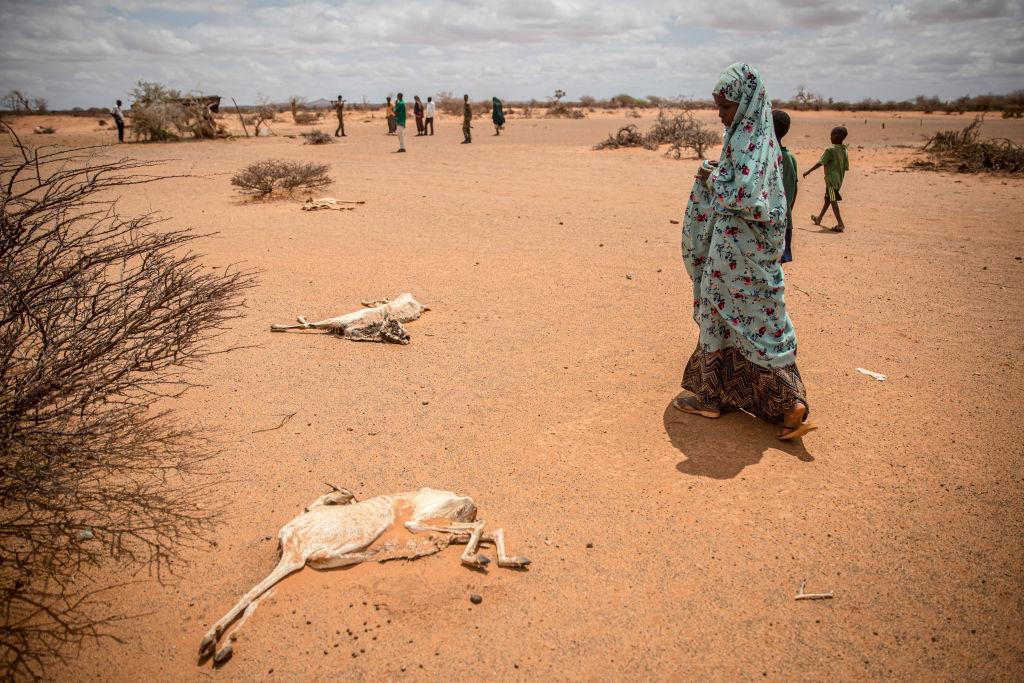
More than 1 million people have been displaced by drought in Somalia, according to staggering figures released yesterday by the U.N. Refugee Agency and Norwegian Refugee Council (NRC). The majority of them—some 775,000 people—were displaced this year as the country of 16 million grapples with a drought that began in January 2021. It’s Somalia’s worst one in decades, forcing people from rural areas to flee to cities in search of food and water.
For a country already struggling with a three-decade old civil war and political instability, the environmental catastrophe has had devastating consequences. Crops are failing while millions of livestock die, as the drought cripples the main source of income for 80% of the population, leaving 5 million people at risk of starvation. The U.N. humanitarian coordinator for Somalia, Adam Abdelmoula, said in June that thousands of Somalis have already died.
But as famine looms amid warnings of a fifth failed rainy season in the coming months, the world is mostly looking the other way. Experts tell TIME that, rather than view the drought as a domestic issue, the international community should see it as a harbinger of more to come—that the climate emergency will continue to have disproportionate effects on the Global South and jeopardize global security.
“Now we have a weather pattern [in Somalia] that is increasingly erratic, with less rain in the last decade, and flooding when there is rain,” says Mohamed Abdi, NRC’s Somalia country director. “And climate change means the situation is only going to get worse.”
The war in Ukraine is exacerbating the crisis. In 2020, Somalia imported $17.7 million of grain, with 90% coming from Russia and Ukraine. The disruption to grain supplies caused by the war has sent food prices soaring, making it more expensive to substitute the food once provided by livestock with wheat. The number of people facing crisis hunger levels is expected to rise to more than 7 million by September, according to Relief Web International.
According to Claire McConnell, climate diplomacy policy adviser at London-based think tank E3G, the war in Ukraine is shining a light on a food security crisis that has been years in the making. “Many countries in the Global South were already really struggling with prices for certain commodities in part due to supply chain disruptions during the COVID-19 pandemic, but mostly due to the climate impacts in crop-producing countries,” she says.
The drought in Somalia demonstrates how the climate crisis acts like a “threat multiplier,” McConnell says, with knock-on effects on human life, livelihoods, agriculture, industry and even national security.
Meanwhile, militants are exploiting the drought to strengthen their grip on the east African nation. The al-Qaeda-allied al-Shabab controls large swaths of the countryside in central and southern Somalia, making almost 900,000 Somalis in need of aid unreachable to international organizations. Militants have reportedly been demanding payment from aid organizations to distribute food and are taking credit for the supplies in order to shore up rural support.
This is also complicating Washington’s mission in Somalia. U.S. President Joe Biden in May ordered the return of nearly 500 troops to support the fight against al-Shabab, after the election of Hassan Sheikh Mohamud as Somalia’s President ended a political vacuum of more than a year.
Read More: Why Biden Is Redeploying Troops to Somalia
E3G’s McConnell draws a comparison to the 2011 Arab uprisings, where rising food prices caused by political instability and extreme weather triggered a wave of social unrest.
The crisis will only get worse as long as the international community looks the other way, says Abdi. “Even though as humanitarian organizations we have been talking about it for months now, the resources have been very slow to come,” he adds. Washington pledged an additional $476 million in aid to Somalia in July, but the U.N. says it needs $1.5 billion to protect people from hunger and poverty.
Experts say that long-term investment in the Global South is just as important as short-term help, as climate change accelerates the frequency and intensity of such environmental crises. Somalia “needs funding to support communities in building resilience,” Abdi adds, “to grow crops that are resilient to the extreme weather patterns, and build water infrastructures in case of rain season failure.”
The 27th U.N. Climate Change Conference due to be hosted in Sharm El-Sheikh, Egypt in November will put the commitments made by rich nations at last year’s COP26 conference to the test, McConnell says. “A lot of local communities [in the Global South] already have some of the skills and the knowledge to help adapt to some of these climate impacts, but are often lacking the finance or the support to scale that.”
But the millions of people in Somalia potentially facing starvation can’t afford to wait until then. “If we don’t do anything in the coming weeks and months, I’m afraid we will see more deaths,” Abdi says. “Somalia has become the forgotten crisis, and the world needs to pay attention.”
More Must-Reads from TIME
- Cybersecurity Experts Are Sounding the Alarm on DOGE
- Meet the 2025 Women of the Year
- The Harsh Truth About Disability Inclusion
- Why Do More Young Adults Have Cancer?
- Colman Domingo Leads With Radical Love
- How to Get Better at Doing Things Alone
- Michelle Zauner Stares Down the Darkness
Contact us at letters@time.com